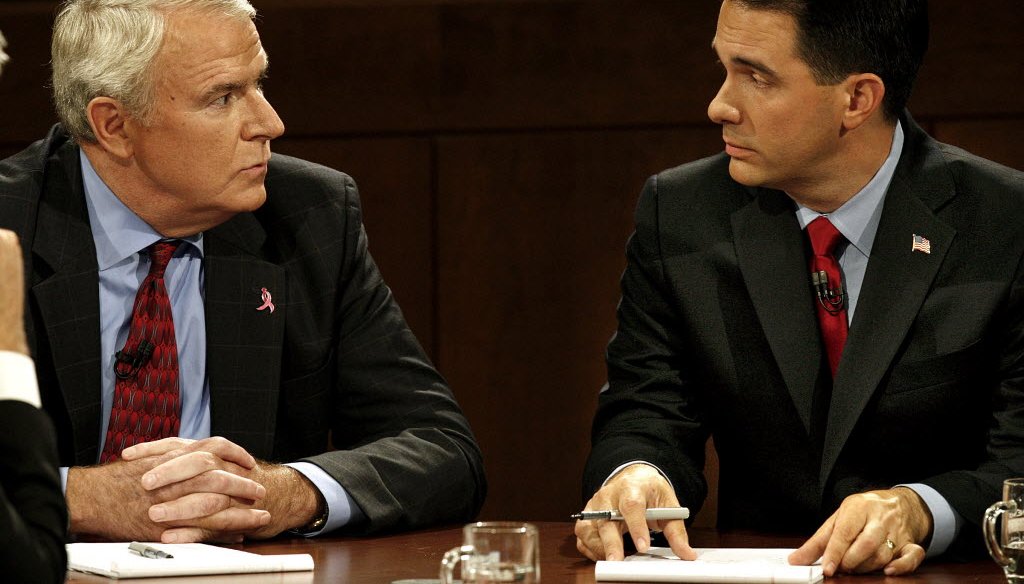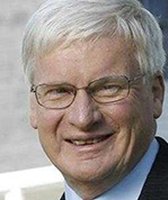Stand up for the facts!
Our only agenda is to publish the truth so you can be an informed participant in democracy.
We need your help.
I would like to contribute

Scott Walker and Tom Barrett faced off in a second gubernatorial debate, at Marquette University Law School, on Oct. 15, 2010. Journal Sentinel file photo.
Three years into his term and one year from the gubernatorial election, Gov. Scott Walker has kept a solid majority of the key campaign promises he made in defeating Democrat Tom Barrett in 2010.
That’s the verdict of PolitiFact Wisconsin’s Walk-O-Meter, which tracks 65 of the Republican governor’s campaign pledges.
Bolstered by GOP legislative control, Walker kept promises to cut taxes, expand alternatives to public schooling, reject federal train funds and broaden gun rights in a tumultuous term dominated by his drive to eliminate most public-sector collective bargaining.
The best-known Walker promise, of course, involves not so much an action as an outcome -- that Wisconsin’s private-sector economy would add 250,000 jobs in his four years.
Wisconsin’s employment recovery from the Great Recession began in 2010 and has continued under Walker, but the job gain so far lags his hoped-for pace. The state has added about 90,000 private jobs through August 2013, we reported in September. That promise remains In the Works and Walker has contrasted the gains with huge job losses in the four years before he took office.
Sign up for PolitiFact texts
Political analysts differ on how critical the jobs results will be to Walker’s 2014 re-election chances. Some say there will be wildcards in the next 12 months.
"The things that will determine the gubernatorial election are things we are not talking about right now," said Mark Graul, a GOP strategist and founder of Arena Strategy Group, a public affairs firm.
Still, jobs and the Wisconsin economy were far and away the biggest state issues on people’s minds heading into 2014, trailed only by dissatisfaction with government, according to the fall 2013 St. Norbert College/Wisconsin Public Radio Wisconsin Survey.
And people’s opinion on Wisconsin’s job-creation performance colors their view of Walker’s job performance -- regardless of which political party they affiliate with, said Charles Franklin, citing 2013 results from the Marquette Law School polls he directs.
"It’s hard to believe that jobs ever goes away as an issue," Franklin said.
Playing for keeps
As of early November, PolitiFact Wisconsin has rated 55 percent of Walker’s promises as Kept, 14 percent Compromise and 14 percent Broken. Another 17 percent await a final ruling (12 percent are Stalled, 5 percent are In the Works).
Walker has kept more than two-thirds of promises that we’ve assigned a rating of Kept, Broken or Compromise.
Of course, not all the promises have equal heft. Walker has kept 10 of 20 promises that we determined have the broadest impact or drew vocal protests, or both. Another two were rated Compromises and three were Broken. The rest are still In the Works or Stalled for now.
As we’ve noted before, Walker made an impressive number of detailed promises in his 2010 run for the governor’s chair -- but did not run on the most controversial of his early actions, the move against public unions.
With the state’s finances hurting amid declining tax collections, the 2010 campaign dwelled on budget, taxation and "putting Madison on a diet," as Barrett put it. Walker signalled he would ask state workers to contribute more towards their pensions and health insurance, but did not campaign on curtailing collective bargaining, the law that became Act 10.
Walker committed to freeze property taxes in his first budget (Kept), stop plans for a Madison-to-Milwaukee rail link (Kept), lower the income tax (Kept), and cut small-business taxes (Compromise).
"We are now able to provide nearly $1 billion in tax relief for Wisconsin families and businesses," Walker said when legislators passed the 2013-15 budget.
Walker also promised to veto any and all tax increases. His first budget contained many tax cuts and a net tax decrease overall but reduced tax credits for low-income workers, homeowners and renters, earning him a Promise Broken. The non-partisan Legislative Fiscal Bureau scored the change in the credits as a tax increase.
Progress on education promises
On other issues, candidate Walker pledged to sign a repeal of the state’s indoor smoking ban (Broken), sign a voter-ID bill (Kept), lift Wisconsin’s nuclear moratorium (Stalled), and a return to traditional deer hunting (Kept).
The former Milwaukee County executive promised to pass and sign concealed-carry legislation (Kept). He pledged to adopt a strong "Castle Doctrine" law (Kept). He came through on a promise to remove enrollment caps for the Milwaukee private school choice program and for virtual charter schools on removing residency requirements for teachers.
Walker balanced his first budget after inheriting a large projected shortfall, but came up short on sweeping promises to strip policy and pork items from the budget (Broken) and end raids on special state funds to aid other programs (Broken).
Education policy was fertile ground for the new governor. Walker chalked up Compromise ratings on a grading scale for schools and on ending social promotion for third-graders who can’t read. He worked cooperatively with Evers on several reforms.
Another theme three years into Walker’s term has been attempts to roll back, in full or part, positions taken and changes made by Jim Doyle, the Democrat who served two terms before declining to seek re-election in 2010.
In addition to stopping the high-speed rail project, Walker kept promises to reverse an early prison release policy adopted under Doyle and reopen tourism visitor centers closed under the Democrat.
He won partial reversal of 2009 increases in capital gains taxes (Compromise) and the "combined reporting" tax (Compromise).
But Walker did not move to repeal Doyle’s income-tax hike on the wealthiest tier of Wisconsin taxpayers (Broken).
Not all the promises on the Walk-O-Meter involved sweeping program changes.
Walker said he’d set up a phone hotline in the governor’s office for businesses (Broken), and require cabinet officials to dine with state employees to hear efficiency ideas (Kept).
One year to go
On promises big and small, there’s work to do for Walker before the 2014 election.
He promised to set up a website disclosing state contract awards and require lobbyists to report work on behalf of clients vying for state contracts (Stalled). He pledged to lift the moratorium on nuclear plants (Stalled) and phase out state taxes on retirement income (Stalled).
Hanging over it all is the jobs issue, which Walker has made the centerpiece of his economic agenda.
"I don’t think he has any choice but to talk about the economy in general," Graul said. "He’ll sell his economic record by saying here’s what I did to try and improve the economy. That we were losing jobs and now we’re adding them."
Our Sources
PolitiFact Wisconsin analysis of Walk-O-Meter
Interviews with Tom Evenson, Gov. Scott Walker’s press secretary, Oct. 23-Nov. 5, 2013
Interview with Mark Graul, founder, Arena Strategy Group LLC, Nov. 5, 2013
Interview with Charles Franklin, Marquette University professor of public policy, director MU Law School Poll, Nov. 6, 2013







































